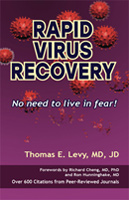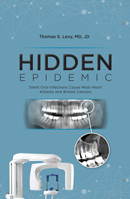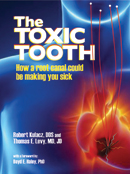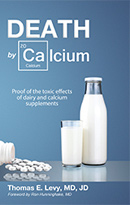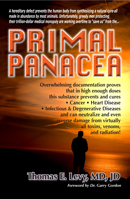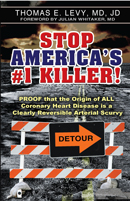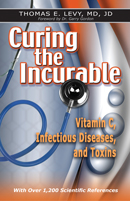Cardiologist speaks truth about cholesterol and statins
September 18, 2013 by Dr. Thomas LevyIs elevated cholesterol really a problem? In a word, absolutely! However, beyond that assertion, there is a lot about cholesterol that is little known or completely misunderstood. Elevated cholesterol levels feed the growth of obstructive plaques in the coronary arteries, and the higher the cholesterol levels, generally the more rapid the growth of the plaques.
Very elevated cholesterol levels clearly increase the chances of having a heart attack as long as they are up, with the highest levels having the highest risks. So, extremely elevated cholesterol levels (280 mg% or greater) need to be avoided at all costs.
Obviously, I want to get my cholesterol as low as possible, right?
Here's where it gets just a little complicated...
Cholesterol levels rise because they are one of the body's natural defense mechanisms against a wide variety of toxins. The higher the toxin presence, the higher the cholesterol goes to help block/neutralize the increased oxidative stress coming from those toxins. So, the more heart disease is aggravated as the cholesterol levels rise.
But... you don't want to lower the cholesterol levels without lowering the toxin presence as well. Otherwise, you'll just have more un-neutralized toxins in the blood and in the body, causing increased oxidative stress and damage wherever they go.
Then what do I do when my cholesterol is elevated?
What needs to be done is to identify your toxin sources, eliminate them, and take an antioxidant regimen that will neutralize the pro-oxidant effects of the toxins that are still present. If this is done effectively, cholesterol levels will normalize all by themselves, without the need to use anti-cholesterol drugs such as statins.
Isn't it good to take a statin drug just to make sure that my cholesterol stays nice and low? Not really. When just the elevated cholesterol level is treated with a statin and no attempt is made to lower toxin exposure and/or to neutralize existing toxins with antioxidants such as vitamin C, your chances of cancer dramatically rise.
The lower your cholesterol levels go without addressing the underlying toxin presence, the greater your chances of cancer. Period.
Furthermore, in a recent 2013 study, it has now been shown that long-term statin use is associated with increased risks of two different types of breast cancer, completely consistent with the long-established link between cancer and low cholesterol. Multiple earlier studies have conclusively shown that cancer risk goes up as cholesterol goes down, whether from drugs or from severe dietary cholesterol restriction.
So what is a good cholesterol level, anyway?
As a general guideline, when new toxin exposures have been properly addressed, and normal daily toxin exposures are all that remain, most adults will end up with a "normal" cholesterol level between 160 and 220 mg%. You never want a cholesterol level to chronically stay below 150 mg%.
The low cholesterol levels resulting from very strict vegetarian diets are probably the biggest downside of such a way of eating. Nathan Pritikin, the father of the largely vegetarian Pritikin diet, had been diagnosed with heart disease at the age of 41. His cholesterol was over 300 mg%.
After following his own diet, he eventually lowered his cholesterol to 120 mg%. However, he ultimately ended up with two different kinds of leukemia, and he finally committed suicide many years later.
At autopsy, he had achieved his goal of having notably healthy and clean coronary arteries. So, cholesterol definitely accelerates heart disease and lowering cholesterol does help to resolve heart disease. However, the answer to an elevated cholesterol levels is not to solely lower it with drugs and leave endogenous toxins unaddressed.
So, statins should never be taken?
Yes and no. If your cholesterol is above 300 mg% and you refuse to address your toxins, such as the proper removal of root canal-treated teeth, you will probably live longer taking a statin and getting your cholesterol back into the mid-200 range.
But the toxins will still be doing their work, and you chances of contracting and aggravating any of a wide variety of conditions, including cancer, will be increased. And be prepared to deal with the many possible side effects of statins, including, but not limited to: muscle pain and damage, liver damage, digestive problems, rashes, increased blood sugar that could lead to diabetes, and a variety of neurological problems, including memory loss and confusion.
And what do I do if I don't want to take statins?
Dental toxicity needs to be addressed, as well as digestive toxicity. Both of these topics have been addressed in earlier articles. Multigram doses of vitamin C, in regular and liposome-encapsulated forms, should be taken on a daily basis, along with as wide a variety of other quality antioxidant supplements as can reasonably be afforded.
References:
http://www.ncbi.nlm.nih.gov/pubmed/?term=23833125
http://www.ncbi.nlm.nih.gov/pubmed/?term=schatzkin+8554
http://www.ncbi.nlm.nih.gov/pubmed/?term=cowan+131+468
Levy, T. (2001) Optimal Nutrition for Optimal Health New York, NY: Keats Publishing
More articles:
June 22, 2013 | Liposome-Encapsulated Glutathione
July 9, 2013 | Root canals are a primary cause of chronic disease
June 27, 2013 | Calcium, the Toxic Supplement
July 28, 2013 | Vitamin C With Vaccinations
August 3, 2013 | Avoiding Digestive Toxicity
August 10, 2013 | The disease causing dangers of high iron levels
August 19, 2013 | Vitamin C better than chemotherapy
September 2, 2013 | The marketing myth of ’vitamin C complex’
September 18, 2013 | Cardiologist speaks truth about cholesterol and statins
October 2, 2013 | Reverse shingles with vitamin C
October 14, 2013 | The effective prevention and treatment of radiation exposure
October 29, 2013 | Undiagnosed scurvy causes widespread disease
November 19, 2013 | Eliminate lead toxicity by consuming vitamin C
November 29, 2013 | New study says high fat diet is healthy
January 1, 2014 | Osteoporosis is much more than calcium deficiency
February 21, 2014 | Vitamin C is the 'muscle' of the immune system
March 11, 2014 | Reversing disease with the 'multi-C' protocol
April 6, 2014 | The dangers of magnesium deficiency
April 11, 2014 | Exposing the truth about liposomal nutrients
July 13, 2014 | Best nutrients to have in your ‘one a day’ supplement
August 3, 2014 | Surprising solution for Ebola virus
October 19, 2014 | Can natural protocols be an effective treatment for Ebola?
November 16, 2014 | Medical warning: Gluten allergies affect everyone
December 5, 2014 | Holistic dentistry pioneer Dr. Hal Huggins dies at 77 but his legacy will live forever
December 23, 2014 | Can a dental infection cause a massive heart attack?
January 29, 2015 | Most cardiologists shocked to discover the true cause of heart attacks
September 2, 2015 | The number one cause for 90 percent of all heart attacks
February 15, 2016 | The most popular vitamin C myths exposed
February 27, 2016 | How to effectively treat viral infections, including Ebola and Zika
March 14, 2016 | The never-ending war against vitamin C
May 22, 2017 | Vitamin C and sepsis: The genie is now out of the bottle
June 22, 2019 | Most cardiologists shocked to discover the true cause of heart attacks
July 3, 2019 | Can a dental infection cause a massive heart attack?
September 30, 2019 | Medical warning: Gluten allergies affect everyone
March 19, 2020 | Best nutrients to have in your 'one a day' supplement
October 30, 2020 | The dangers of magnesium deficiency
About NaturalHealth365
Dr. Levy regularly contributes brief articles of interest to the NaturalHealth365 website, which can accessed here: www.naturalhealth365.com.


